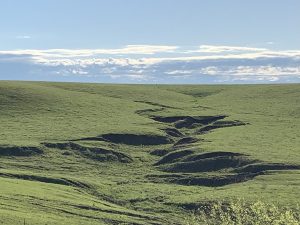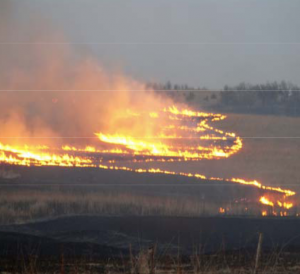
You already know that grass fire is a natural part of the prairie. Because of this, ranchers set fires every spring to burn the grasslands in the Flint Hills of Kansas, one of the few remaining stands of tallgrass prairie in North America. These grasslands burned historically too. We are going to use the burning of tallgrass prairie in the Flint Hills as a case study that can help us see, analyze, and evaluate the paradigm that stood in successful opposition to your intuitive sense that there’s something important about powerline clearings and edge effects that people are missing.
Please look at that sentence again, that states our purpose for walking this path. It is very common for people to talk about powerline clearings or wildland fires in terms of the things themselves — the clearings, the fires, the edge effect, or species diversity. We are not doing that. You can get that sort of information from any of a thousand resources. Instead, we are using these examples to help you see, analyze, and evaluate fundamental paradigms of Western culture that continue to block not only your own paradigm shift, but everyone else’s too. Paradigms rooted in West and North are particularly hard to dig up because of Western culture’s reluctance to deal with those quadrants, so the work we’re doing here may sometimes make you feel uncomfortable. If so, remind your distressed self that you were warned “West and North are directions that often trouble and frighten people of Western culture, who therefore turn away from the wisdom these directions provide,” but that I also told you, “the astonishing truth is that the things we’re afraid to look at in West and in North liberate what’s been imprisoned for generations.” So please hang in there, and trust me.
As your first step on the journey, read this report from US News. (If the link stops working, you can download a PDF here.) After you read the report, sit for a while with the information it provides, and think about it. You had an impression of fire in grasslands before you read that story, and also a larger general impression of wildfire. Pay attention to the ways that understanding shifts around within you as you process the information in the report. Once you feel like this has all sort of settled down and grown calm, then go on with the exercise. Don’t feel you have to rush the process. If you feel discomfort, please don’t worry too much. That discomfort is your intuition trying to communicate with you, and it’s good it has a voice. The paradigm blocking that inner voice is what we’re after here.

First, what would be your usual way of beginning to think about or deal with the situation described in the news report, if you were asked to help resolve these problems? What sorts of issues would you immediately identify as essential to learn more about or to address in some way? Please sketch those out in no more than 3-4 sentences. What we are doing here is giving your professional self an opportunity to respond the way it knows how. It’s brimming with years of education and experience it wants to put into action in a situation like this. So do NOT look up extra information, and do NOT go into detail, but DO outline a quick course of action — just 3-4 sentences! — you would normally take if asked to offer your expertise. Then set that document aside, pat the part of yourself that wrote it on the back — job well done, Self! — and come back here to look at this situation a little differently.
Remember: our goal here is to learn to analyze and evaluate paradigms. Now that you’ve thought about how you’d respond if you’d been called in to help, let all that go and reflect on the reactions you had when you first read the report. These could point to a possible inner paradigm conflict you pushed aside.
As you reflect on your initial response to the information in this report, at any point did it feel like the information you read threatened to overturn an important ecological or environmental concept you would rather wasn’t overturned? If so, what idea did you feel was being threatened? (Note: Writing about this sense of threat is safe. It won’t harm anything or anyone. No one will see what you write, and you can even destroy the document when you’re done if you wish.)
Were you able to resolve this problematic “threat” within yourself as you read and thought about the information presented? If so, looking back at that, how did you lay the perceived threat to rest? Are you fully satisfied with the way you resolved this? If not, jot down what still bothers you.
If you were not completely able to lay the perceived threat to rest, did you find yourself wondering with frustration or even a little anger: “What’s the point of reading a thing like this!?” Does thinking about what it was that made you uncomfortable then, and why, provide you with any clues about the nature of the paradigm that got irritated within you? Or do you just feel vaguely upset or irritated?
Look at the report one more time with awareness of this type of paradigm irritation within your own self, regardless of what you think that’s about or what the paradigm is that’s irritated. Do any of the quotes or passages suggest that some of the people interviewed were feeling something of the same irritation you felt? That is, can you see evidence of paradigmatic discomfort in any of the passages with peoples’ quotes? Do any passages suggest that the reporter herself might have been having a response like yours, that guided who she chose to interview or what she asked them? It may help here to remember that the two most common responses to information that challenges a paradigm are to bend the information so it fits the existing paradigm after all, or to bend the paradigm so it’s now big enough to handle the information that was at first problematic. So look for reframing or reinterpretation of information that shifts its significance. The pattern often looks like this:
“Fact X suggests there is a problem.”
I don’t want a problem.
So I will will decide that “Fact X turns out not to be a problem because [reason].” The reason could be that fact X has been misunderstood, or it could be that the paradigmatic context always had room in it for fact X but people didn’t realize this.
Take a careful look and see if you can spot this pattern anywhere in the materials you’ve just read.
What seems to be the existing paradigm that the smoke problem is challenging?
Go to the next page, Fire.
